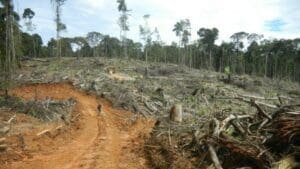[ad_1]

There are important changes in trade regulation occurring that supply chain professionals need to be aware of. Environmental, social and governance issues are increasingly finding their way into trade policy. Increases in business process outsourcing means that human rights and environmental violations are no longer only an internal company matter, companies are expected to monitor their end-to-end inbound supply chains. End-to-end means that this monitoring extends beyond a company’s immediate suppliers to include a supplier’s supplier, and that supplier’s supplier, and on up through the supply chain. Procurement managers are now asked to address ESG issues in their sourcing and foreign manufacturing operations. Meanwhile, trade compliance managers are tasked with ensuring that the procurement department is following the rules.
This article will focus on European Union trade regulations because the EU leads in this area. Typically, North America and other regions eventually create similar rules. Further, non-EU firms are subject to these regulations if they want to do business in Europe.
Global Deforestation and Forest Degradation
In December of 2022, a deforestation-free regulation was passed that was focused on the sourcing of cocoa, coffee, soy, wood, palm oil, rubber, and cattle. This trade regulation is designed to protect the world’s forests. Forests are an important carbon sink and thus help to reduce global warming. The regulation requires any company importing or exporting these commodities from the EU to prove the products are deforestation-free.
Conflict Minerals
Conflict Minerals refer to raw materials or minerals that are mined in regions of the world where conflict is endemic, and the mining of these minerals contributes to human misery. The eastern Democratic Republic of the Congo has a history of conflict, where various armies, rebel groups, and outside actors have profited from mining while contributing to violence and exploitation. Conflict minerals include tin, tungsten, tantalum, and gold. These minerals are extracted and passed through a variety of intermediaries before being sold to international markets. These four products are essential in the manufacture of a variety of devices, including consumer electronics such as smartphones, tablets, and computers. As of January 2021, the regulation requires European Union companies to ensure they import these minerals and metals from responsible and conflict-free sources only.
The Corporate Sustainability Reporting Directive
In January 2023, the Germany Supply Chain Due Diligence Act came into effect, requiring businesses to monitor supply chains for human rights violations and compliance with environmental standards across their multi-tier supply chain.
As was predicted, the German Supply Chain act led the European Union to adopt similar regulations. As of July 31st, 2023, the European Sustainability Reporting Standards has been officially adopted. A company’s reporting requirements include data on the environmental, social, and governance impacts of their activities. The goal is to have not only more ESG data, but more reliable data, and a format that makes it easier to compare the performance of different companies in an industry.
The governance category includes requirements like anti-corruption and bribery and having diversity on company boards. Complying with all trade laws would also fall under the governance category. In terms of the environment, companies need to report on how their activities affect climate change, pollution, water resources, biodiversity, and the circular economy.
The social category includes reporting qualitative and quantitative information on how companies treat their own workforce, workers in the value chain, affected communities, and consumers. In considering how workers in a company’s upstream value chain are treated, several things need to be examined: working conditions; non-discrimination; whether forced or child labor is being used, and whether workers in a campus environment have adequate housing.
As is true with the German Supply Chain Act, it is trying to get visibility to a multi-tier supply chain that will be the most difficult thing for trade professionals to accomplish.
Carbon Border Adjustment Mechanism
As the European Union raises its own climate ambition, yet less stringent climate policies prevail in other parts of the world, there is a risk of carbon leakage. Carbon leakage occurs when companies based in the EU move carbon-intensive production abroad to countries where less stringent climate policies are in place than in the EU, or when EU products get replaced by more carbon-intensive imports.
The EU’s Carbon Border Adjustment Mechanism is designed to put a fair price on the carbon emitted during the production of carbon intensive goods that are entering the EU, and to encourage cleaner industrial production in non-EU countries. This is the most far reaching of all the regulations discussed, but at present CBAM is being gradually phased in.
Final Thoughts
Before the German Supply Chain Act, supply chain practitioners had never seen compliance legislation that was so broad and impactful. In the past, ESG legislation was focused on a specific risk domain, like conflict minerals, child labor or the 2020 Uyghur Forced Labor Act. Now we are seeing a move to all-encompassing ESG legislation that spills into trade law and has significant penalties.
While global trade compliance solutions offer lists of companies and people companies should not do business with, there are few proven tools for helping companies identify what companies are in a company’s extended supply chain. Initially, regulatory bodies will be looking for good faith efforts in this area and are unlikely to penalize companies making those efforts.
[ad_2]
Source link













